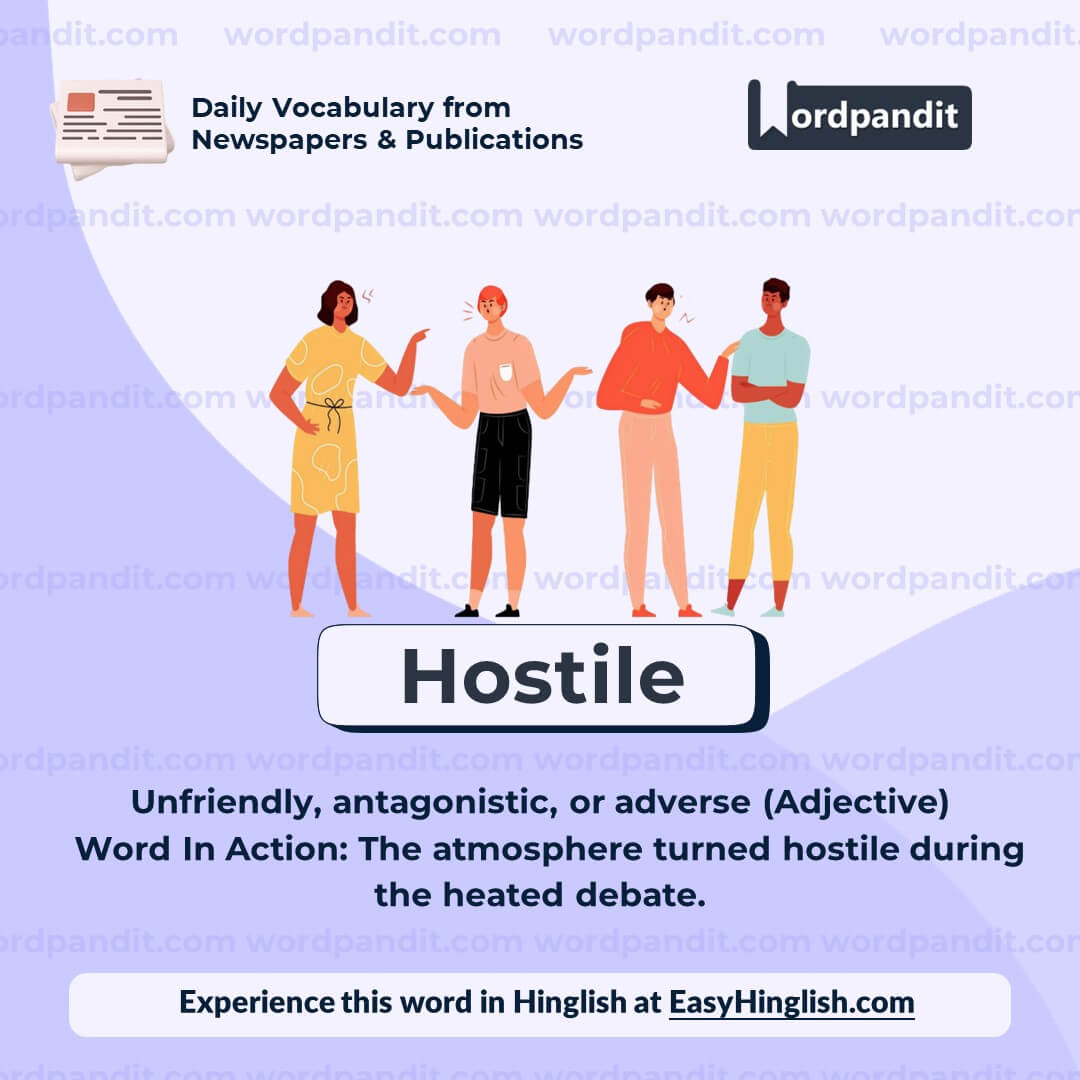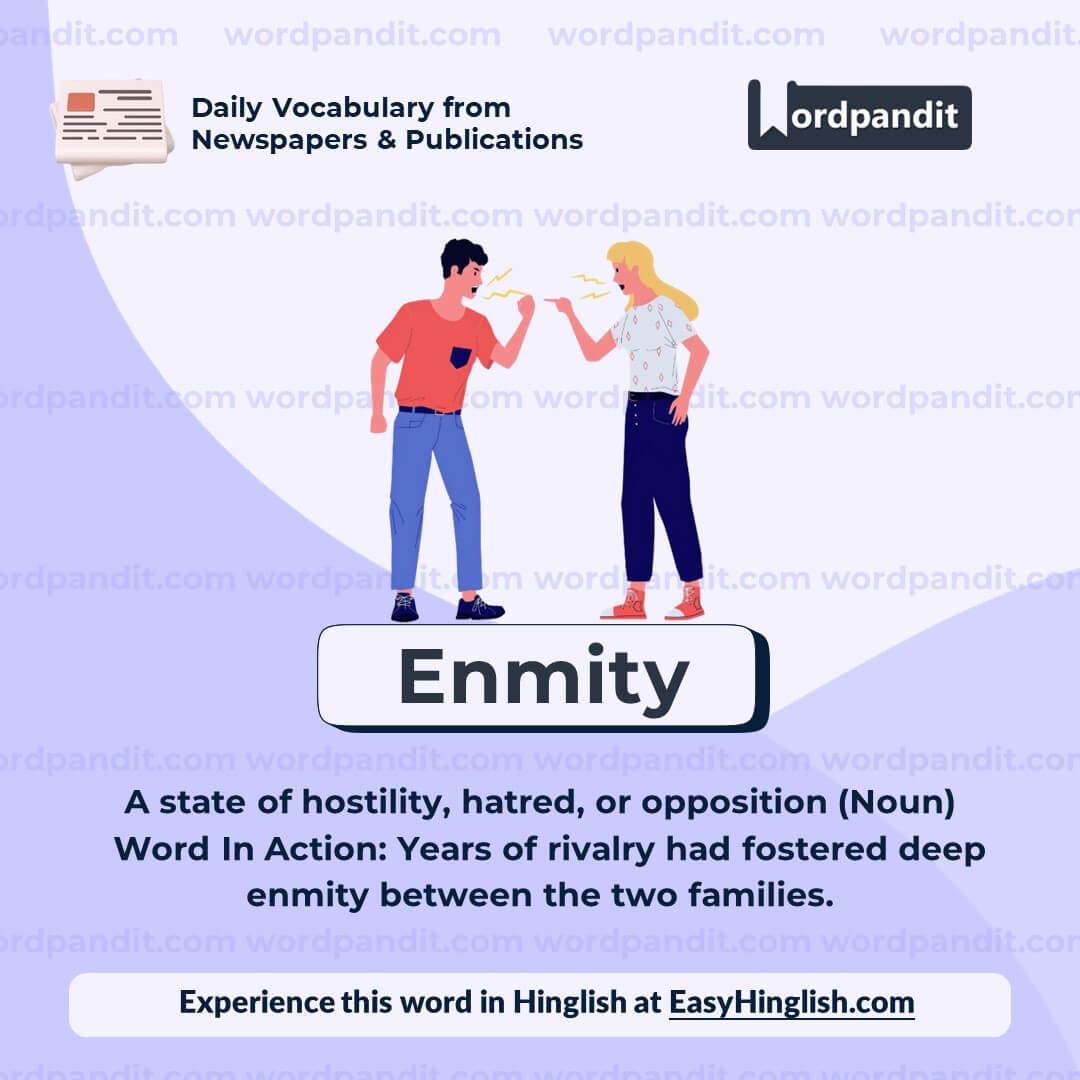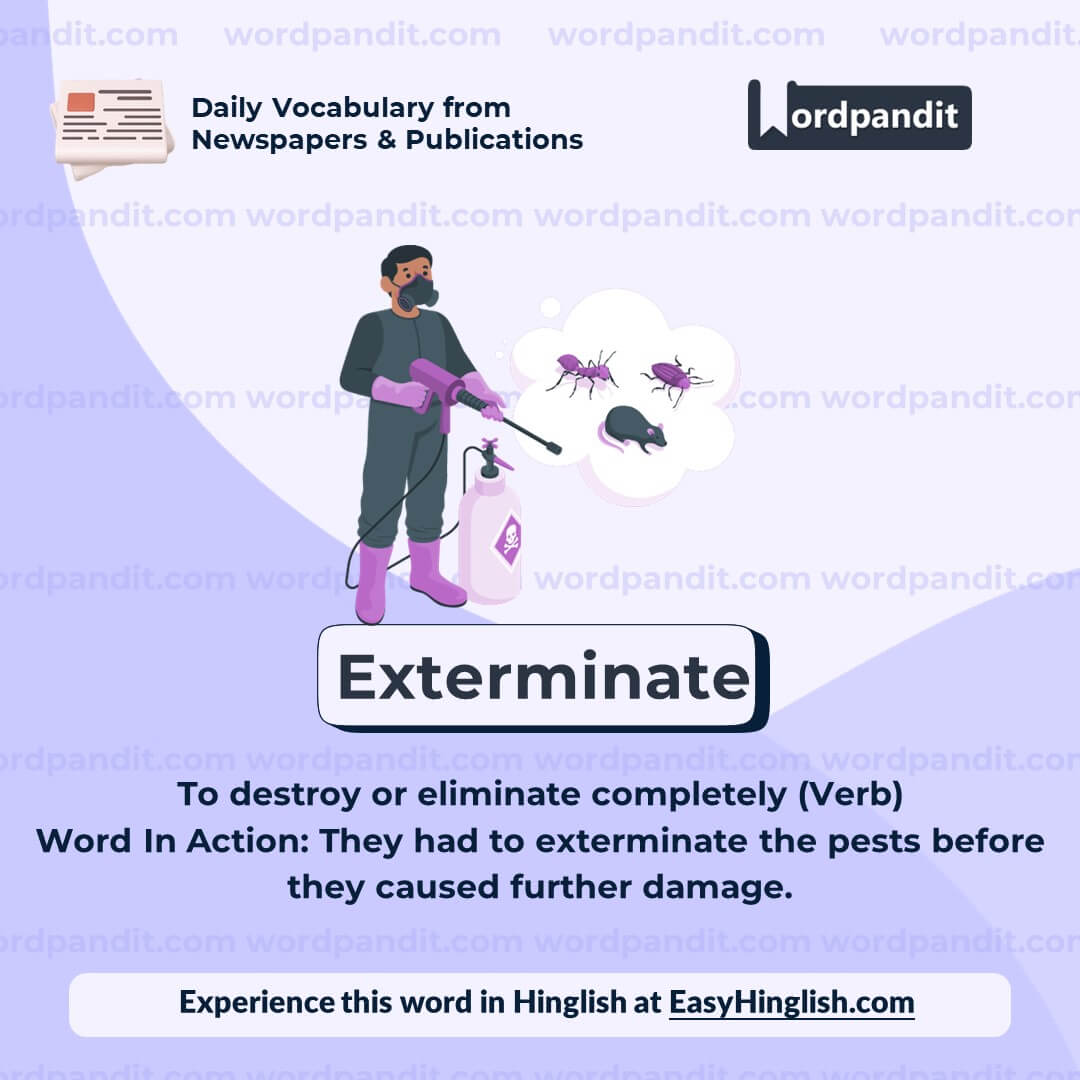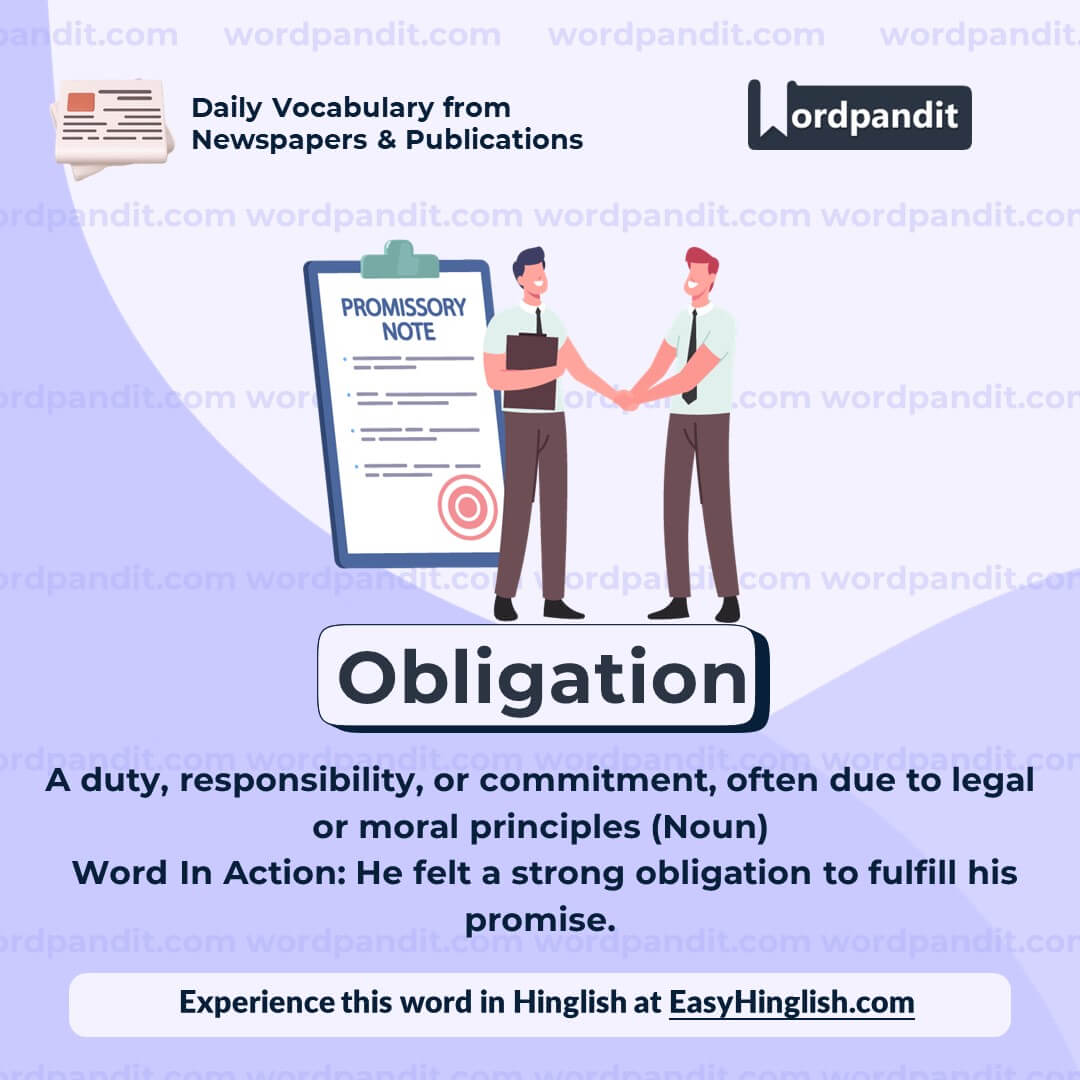Daily Vocabulary from Indian Newspapers and Publications
Welcome to Wordpandit’s Indian Vocabulary Hub
At Wordpandit, we understand the importance of staying rooted in the local context while expanding your language skills. This section focuses on enriching your vocabulary with words and phrases drawn from India’s leading newspapers and publications, ensuring you're learning vocabulary that is practical, relevant, and uniquely Indian.
Why Indian Sources Matter
We believe that the best way to master any language is by immersing yourself in local content. That’s why we carefully curate vocabulary from top Indian publications, including:
- The Hindu
- The Times of India
- The Economic Times
- Hindustan Times
- Live Mint
- The Indian Express
- And many others...
Stay Updated, Stay Relevant
With daily updates from Indian news sources, you’ll be consistently learning words that reflect the trends and shifts in Indian society and culture. Our focus is to provide vocabulary that enhances your understanding of the language in an Indian context.
How Wordpandit Supports Your Goals
Whether you’re preparing for exams, aiming to improve your professional communication, or simply want to stay connected with the latest Indian vocabulary, Wordpandit is here to guide you every step of the way.
Learn with a Practical Approach
Our interactive learning methodology includes real-world examples, engaging activities, and context-specific usage to ensure that every word becomes part of your active vocabulary.
Dive into Indian Vocabulary Today!
Why Choose Wordpandit?
Practical Learning: Focus on words you'll actually encounter in real-world reading, enhancing your comprehension and communication skills.
Diverse Content: From current affairs to scientific breakthroughs, our varied sources expose you to vocabulary across multiple domains.
Effortless Integration: Make Wordpandit a part of your daily routine. Just a few minutes each day can significantly boost your lexicon over time.
Your Path to Vocabulary Mastery
- Visit our Daily Vocabulary section regularly
- Explore new words and their usage in context
- Practice incorporating these words into your own writing and speech
- Track your progress as your vocabulary expands
Start Your Journey Today
Embark on your vocabulary enhancement journey with Wordpandit. By consistently engaging with our daily posts, you'll build a robust vocabulary that serves you well in academic, professional, and personal contexts.
Remember, a word a day keeps linguistic limitations at bay. Make Wordpandit your daily companion in the quest for vocabulary excellence!
WORD-1: Hostile
Context:
"For then, as in any ‘frozen conflict’, the enmity will remain simmering quietly within to give way to periodic hostile flashpoints in the future." - The New Indian Express
Explanatory Paragraph:
The word "hostile" describes an attitude, action, or environment that is unfriendly, antagonistic, or adverse. It is often used in contexts where there is conflict or opposition, either physically or emotionally.
Meaning: Unfriendly, antagonistic, or adverse. (Adjective)
Pronunciation: HOS-tyl
Difficulty Level: ⭐⭐ Beginner
Etymology: From Latin "hostilis," meaning "pertaining to an enemy," derived from "hostis," meaning "enemy."
Synonyms & Antonyms:
Synonyms: Aggressive, antagonistic, unfriendly, confrontational
Antonyms: Friendly, amicable, peaceful, welcoming
Usage Examples:
- The hostile tone in his voice made it clear that he was not open to negotiations.
- Relations between the two nations have grown increasingly hostile over territorial disputes.
- The dog’s hostile behavior towards strangers indicated a need for more training.
- The company faced a hostile takeover attempt by its competitor.
Cultural Reference:
"The term 'hostile takeover' is often used in business contexts to describe an aggressive acquisition of a company, typically without the consent of its management." - Business Reference
Think About It:
What factors contribute to hostility in relationships or conflicts, and how can they be mitigated?
Quick Activity:
Think of a situation where you experienced hostility. Write down three ways you could have responded to reduce the tension.
Memory Tip:
Associate "hostile" with "host" and think of it as the opposite of a friendly host—someone who creates an unwelcoming or antagonistic environment.
Real-World Application:
"Hostile" is widely used in contexts ranging from interpersonal conflicts to political disputes and even adverse environmental conditions, such as a "hostile work environment."
WORD-2: Calibration
Context:
"Hence, to cause distress to even one human is bad, but to exterminate millions of germs harmful to humans is good. This value calibration extends even in the assessment of climate change." - The New Indian Express
Explanatory Paragraph:
The word "calibration" refers to the process of carefully adjusting, fine-tuning, or aligning something to achieve accuracy, precision, or balance. It is often used in technical contexts, such as instruments or measurements, but can also apply to abstract ideas like values, priorities, or strategies.
Meaning: The process of carefully adjusting or aligning for accuracy or balance. (Noun)
Pronunciation: kal-uh-BRAY-shun
Difficulty Level: ⭐⭐⭐ Intermediate
Etymology: Derived from the French word "calibrer" and the Latin "calibre," meaning "degree of quality or measure."
Synonyms & Antonyms:
Synonyms: Adjustment, alignment, standardization, fine-tuning
Antonyms: Disarray, imbalance, misalignment
Usage Examples:
- The technician performed a calibration of the scales to ensure accurate measurements.
- Before launching the rocket, the engineers conducted a thorough calibration of the guidance system.
- The value calibration in the company’s ethics policy highlighted the importance of employee well-being.
- Accurate calibration of the thermometer is crucial for precise temperature readings in medical applications.
Cultural Reference:
"Calibration is often referenced in precision-oriented fields, such as physics, where scientists meticulously calibrate equipment to ensure reliable experimental results." - Academic Reference
Think About It:
In what ways can the idea of calibration be applied to personal growth and self-improvement?
Quick Activity:
Identify an area in your life where “calibration” is needed – perhaps balancing work and leisure or improving a daily routine. Write down three steps to achieve this calibration.
Memory Tip:
Link "calibration" with "caliber," as adjusting the caliber (quality or accuracy) of something means calibrating it to perform better.
Real-World Application:
Calibration is essential in industries like healthcare, aviation, and manufacturing, where precise measurements and balanced systems are critical for success and safety.
WORD-3: Enmity
Context:
"For then, as in any ‘frozen conflict’, the enmity will remain simmering quietly within to give way to periodic hostile flashpoints in the future." - The New Indian Express
Explanatory Paragraph:
"Enmity" refers to deep-seated hostility or antagonism between individuals, groups, or nations. Unlike fleeting disagreements, enmity suggests a lasting and often intense feeling of hatred or opposition.
Meaning: A state of hostility, hatred, or opposition. (Noun)
Pronunciation: EN-muh-tee
Difficulty Level: ⭐⭐⭐ Intermediate
Etymology: Derived from Old French "enemisté," based on the Latin "inimicus," meaning "enemy."
Synonyms & Antonyms:
Synonyms: Hostility, animosity, antagonism, hatred
Antonyms: Friendship, amity, harmony, goodwill
Usage Examples:
- The enmity between the two rival factions often led to violent confrontations.
- Despite years of enmity, the two leaders finally agreed to negotiate a peace treaty.
- Her enmity toward her former business partner stemmed from years of betrayal and deceit.
- Generations of enmity between the two families were finally resolved through a mutual agreement.
Cultural Reference:
"Enmity is a recurring theme in Shakespeare’s works, such as in 'Romeo and Juliet,' where the longstanding feud between the Montagues and Capulets creates tragic consequences for the young lovers." - Literary Reference
Think About It:
Can enmity ever be justified, or is it always better to seek resolution and reconciliation?
Quick Activity:
Write down an example of enmity from history or literature. Then, describe one action that could have prevented or resolved it.
Memory Tip:
Think of "enmity" as the "enemy within"—a persistent sense of hostility that lingers and festers over time.
Real-World Application:
"Enmity" is often used in discussions about geopolitical conflicts, rivalries in sports, or interpersonal relationships where strong feelings of opposition or hatred exist.
WORD-4: Exterminate
Context:
"Hence, to cause distress to even one human is bad, but to exterminate millions of germs harmful to humans is good. This value calibration extends even in the assessment of climate change." - The New Indian Express
Explanatory Paragraph:
The word "exterminate" means to destroy completely or eradicate, often used in contexts where something harmful or unwanted is removed on a large scale. It carries a connotation of thoroughness, leaving no trace of what is eliminated.
Meaning: To destroy or eliminate completely. (Verb)
Pronunciation: eks-TUR-muh-nayt
Difficulty Level: ⭐⭐⭐ Intermediate
Etymology: Derived from Latin "exterminare," meaning "to drive out" or "to banish," from "ex-" (out) and "terminare" (to limit or terminate).
Synonyms & Antonyms:
Synonyms: Eradicate, eliminate, destroy, annihilate
Antonyms: Preserve, conserve, protect
Usage Examples:
- The pest control team was hired to exterminate the termites infesting the house.
- Efforts to exterminate invasive species are crucial for maintaining ecological balance.
- The soldiers were ordered to exterminate any threats to their mission.
- The dictator sought to exterminate dissent among the populace, leading to widespread oppression.
Cultural Reference:
"The word 'exterminate' is prominently used in popular media like science fiction, where alien races or robots, such as the Daleks in 'Doctor Who,' are depicted as attempting to exterminate humanity." - Pop Culture Reference
Think About It:
Should the concept of extermination always be viewed negatively, or can it sometimes be justified, such as in the case of harmful pests or diseases?
Quick Activity:
List three scenarios where extermination might be considered necessary and three where it would be morally questionable. Reflect on the differences.
Memory Tip:
Think of "exterminate" as "exit" plus "terminate" – to forcefully terminate something and make it exit for good!
Real-World Application:
The word "exterminate" is frequently used in the context of pest control, war strategies, or efforts to remove harmful organisms, emphasizing the importance of context in its ethical evaluation.
WORD-5: Obligation
Context:
"The situation demands urgent and decisive action from states around the globe to end their support for Israel and fulfil their obligation to prevent genocide in Gaza. We implore the government of India to use all its power to influence a sustainable ceasefire." - The New Indian Express
Explanatory Paragraph:
The word "obligation" refers to a duty or responsibility that someone is bound to fulfill, often due to legal, moral, or social reasons. It implies a commitment to act in a specific way or to ensure certain actions are taken, reflecting accountability or adherence to a standard.
Meaning: A duty, responsibility, or commitment, often due to legal or moral principles. (Noun)
Pronunciation: ob-luh-GAY-shun
Difficulty Level: ⭐⭐ Beginner
Etymology: From Latin "obligatio," meaning "a binding or tying," derived from "obligare," which combines "ob-" (toward) and "ligare" (to bind).
Synonyms & Antonyms:
Synonyms: Duty, responsibility, commitment, accountability
Antonyms: Freedom, discretion, choice, exemption
Usage Examples:
- Citizens have an obligation to follow the laws of their country.
- Parents often feel a strong moral obligation to provide the best for their children.
- The company fulfilled its obligation to compensate the affected employees after the data breach.
- International treaties impose obligations on nations to cooperate for global peace and security.
Cultural Reference:
"Obligation plays a central role in philosophical discussions about ethics and duty, such as in Immanuel Kant's theory of moral imperatives, which emphasizes acting out of a sense of duty." - Philosophical Reference
Think About It:
How do obligations differ when they arise from legal requirements versus moral or personal commitments?
Quick Activity:
Make a list of three obligations you have in your daily life. Reflect on how fulfilling them impacts your relationships or personal growth.
Memory Tip:
Think of "obligation" as something you are "obliged" to do—it's like a contract binding you to act in a certain way.
Real-World Application:
"Obligation" is a key term in law, ethics, and international relations, where it defines responsibilities such as upholding treaties, protecting human rights, or fulfilling social duties.
















